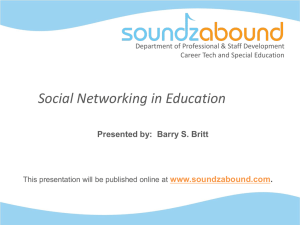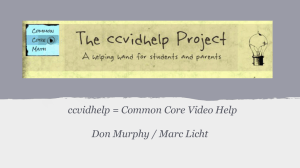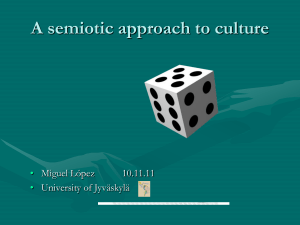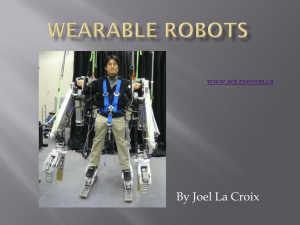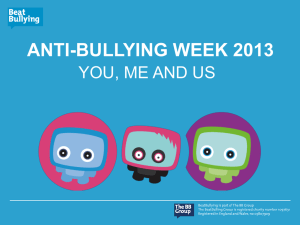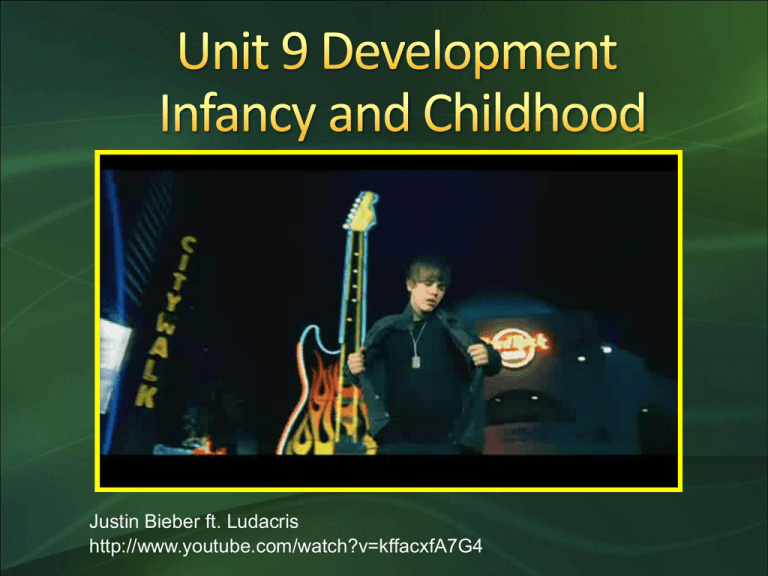
Justin Bieber ft. Ludacris
http://www.youtube.com/watch?v=kffacxfA7G4
1. Nature vs. Nurture: How do genetic inheritance
(nature) and experience (nurture) influence our
development?
blog.lib.umn.edu
2. Continuity vs. Discontinuity (Stages) Is
development a gradual, continuous process like
riding an escalator, or does it proceed through the
sequence of separate states like climbing rungs on
a ladder?
Stability vs. Change: Do our early
personality traits persist through life, or
do we become different persons as we
age?
Cross-Sectional Studies
Participants of different
ages studied at the same
time.
Longitudinal Studies
One group of people
studied over a period of
time.
National Geographic in the womb 3
http://www.youtube.com/watch?v=N4wihBifT7s
Conception begins
with the drop of an
egg and the release of
about 200 million
sperm.
The sperm seeks out
the egg and attempts
to penetrate the eggs
surface.
Once the sperm penetrates the egg- we have a
fertilized egg called……..
The Zygote
The first stage of
prenatal development.
Lasts about two weeks
and consists of rapid
cell division.
Less than half of all
zygotes survive first
two weeks.
About 10 days after
conception, the zygote
will attach itself to
the uterine wall.
The outer part of the
zygote becomes the
placenta (which filters
nutrients).
Embryo
Lasts about 6 weeks.
Heart begins to beat
and the organs begin
to develop.
By nine weeks we have a…
The fetus by about the 6th
month, the stomach and
other organs have formed
enough to survive outside
of mother.
At this time the baby can
hear (and recognize)
sounds and respond to
light.
Chemical agents that can
harm the prenatal
environment.
Alcohol (FAS)
Other STDs can harm
the baby…..
HIV
Herpes
Genital Warts
Struggles of Drug Addicted Babies video from Answers com Videos
http://www.youtube.com/watch?v=80oJMZHjQTA
Fetal Alcohol Syndrome
Habituation: a decrease in responding with
repeated stimulation.
One way to recognize the difference between sleeping and habituating is to
watch your child's behavior when he is awake. A baby who has been asleep
wakes spontaneously and is responsive, alert, and refreshed. But a child who
has been habituating wakes and is soon fussy and irritable - he is exhausted
rather than rested. Forced to protect himself from too much noise, light, activity,
or handling, the habituating baby goes into his cocoon because he is hoping you
will get the message and put him some where he will be more comfortable.
Reflexes:
automatic (means involuntary)
Babinski Reaction- Foot is
responses
rubbed against and the rest
of the toes fan out.
Moro Reflex- Baby feels like
it is falling and arms and legs
go out in search of something
to hang onto.
Rooting Reflex- if the baby is
touched at the end of the
mouth, the baby still turn and
begin to suck.
Grasping Reflex- Touch a
babies hand it will close.
http://www.youtube.com/watch?v=gyVLD0hl0XY
Some of these slides have been adapted from appsychology.com
http://www.youtube.com/watch?v=ocjWFGIQr3s
Visual Cliff
A device used to determine if babies have
depth perception.
gynomite.wordpress.com
Developmental Psychology
Early Childhood
Parallel play
Cooperative
play
Solitary play
the bond between a caregiver and child has a significant impact on a child's
development on both a social and emotional level
Attachment refers to an emotional connection
Mary Ainsworth
Ainsworth had a parent drop off their child with a stranger and then
observed how the child reacted. She came up with Three distinctive
attachments:
1. Secure Attachment- Just like
it sounds the child is secure
that mom is coming back and
happy to see her when she
does.
2. Avoidant Attachment -when
mom comes back the child
avoids them.
3. Anxious Attachment they are
anxious in their surroundings
.
abc-counselling.com
Harry would be an example of having an avoidant
attachment. Although he had loving parents when
he was an infant, he mainly experienced
psychological abuse from his neglectful Aunt and
Uncle while growing up. As shown in the book, he
had a hard time reaching out toward others in the
beginning of his first year and had problems with
expressing his feelings toward girls like Cho Chang
and Ginny Weasley
abc-counselling.com
Hermione is known for having supportive
and understanding parents. This positive
relationship is the epitome of a secure
bond, which is shown through her high
self-esteem and her willingness to develop
a relationship with Viktor Krum in the
Goblet of Fire.
abc-counselling.com
Ron, should show characteristics of an
anxious attachment style. With all his
siblings, Ron probably didn't' get all the
attention he wanted because his parents
had their hands full. However, instead of
being anxious and worried about his love
life, he felt uncomfortable with his
relationship with Lavender Brown.
abc-counselling.com
Konrad Lorenz
allposters.com
Attachment
Attachment is very important for infants to develop.
Konrad Lorenz observed baby geese. When they
were hatched the formed an attachment with the
first thing they saw which was Konrad. This is
called imprinting.
Critical Period: an optimal period when certain
events must take place to facilitate proper
development.
dabase.org
http://www.youtube.com/watch?v=2UIU9XH-mUI&feature=related
By the way psychology’s definition of imprinting is not the same as
the one from Twilight!!
twilightlovers.net
Harry Harlow
Attachment theory
Harry Harlow did
research on Rhesus
monkeys. Inhumane
research. He did
however, show that
monkeys just like babies
need touch to form
attachments. They
needed that contact
comfort.
http://www.youtube.com/watch?v=hsA5Sec6dAI
High quality daycare has shown no
detrimental effects on children over the age
of two.
•There is a difference with how children
turn out between high and low quality.
Can become withdrawn, scared and
sometimes speechless like Genie.
•Harlow’s monkeys would either cower
in fright or act extremely aggressive.
Many could not mate and if they could,
the mothers were unresponsive parents.
•Is there a connection between crime
and lack of childhood attachment?
•Discussion Time….
Apsychology.com
Stage Theorists
These psychologists
believe that we travel
from stage to stage
throughout our
lifetimes.
geekweek.com
from appsychology.com
Sigmund Freud Psychosexual
Stage
from appsychology.com
Sigmund Freud developed
the 5 Stages of
Psychosexual Development
Freud related most things
to our unconscious and our
sexual drive or libido.
He said if you get stalled at
any of the stages you might
have problems later in life.
http://www.youtube.com/watch?v=cvOoYX45G_0&feature=related
from appsychology.com
Stage 1: Oral Stage
Seek pleasure through out
mouths.
Babies put everything in their
mouths (0-2).
People fixated in this stage
tend to overeat, smoke or have
a childhood dependence on
things.
Stage 2: Anal Stage
from appsychology.com
Develops during toilet
training (2-4).
Libido is focused on
controlling waste and
expelling waste.
A person fixated may
become overly
controlling (retentive)
or out of control
(expulsive).
Stage 3: Phallic Stage
from appsychology.com
Children first recognize
their gender (4-7).
Causes conflict in
families with the
Oedipus and Electra
Complexes.
Fixation can cause later
problems in
relationships.
Oedipus Complex
http://www.ffk-wilkinson.com/intl/
Stage 4: Latency Stage
from appsychology.com
Libido is hidden (711).
Cooties stage.
Freud believed
that fixation in
this stage could
lead to sexual
issues.
Stage 5: Genital Stage
from appsychology.com
sweetslyrics.com
Libido is
focused on
their genitals
(12-death).
Freud thought
fixation in this
stage is normal.
Cognitive Development
from appsychology.com
Cognitive deals with memory, thinking and language .
Jean Piaget is one of the founders of Cognitive
development and he looked at how children think. Early
schools of thought were that kids were stupid versions of
adults. Jean Piaget said, “hey they just think differently”
There are 4 Stages.
downstream-parenting.com
1. Object Permanence: The understanding that the an
object exists even if they can not see it.
http://www.youtube.com/watch?v=nwXd7WyWNHY
2. Egocentric: cannot look at the world through
anyone’s eyes but their own.
http://www.youtube.com/watch?v=OinqFgsIbh0
3. Conservation refers to the idea that a quantity
remains the same despite changes in appearance
and is part of logical thinking.
http://www.youtube.com/watch?v=7gUY8GM7rco
Schemas
Children view the
world through schemas
(as do adults for the
most part).
Schemas are ways we
interpret the world
around us.
It is basically what you
picture in your head
when you think of
anything.
Right now in your head,
picture a model.
These 3
probably fit into
your concept
(schema) of a
model.
But does this
one?
Assimilation
If I teach my 3 year
that an animal with 4
legs and a tail is a
dog….
What schema would you
assimilate this into?
smileluver38.webs.com
What
would he
call this?
thundafunda.com
dellone2one.com
When you first meet
somebody, you will
assimilate them into a
schema that you
already have.
If you see two guys dressed like this,
what schema would you assimilate them
into?
•Would you always be right?
Changing an
existing
schema to
adopt to new
information.
If I tell someone from the mid-west to picture their
schema of the Bronx they may talk about the ghetto areas.
But if I showed them other areas of the Bronx, they would be forced to
accommodate (change) their schema to incorporate their new information.
Schema – Freshmen are stupid and goofy.
Scenario – A ninth-grader in your Spanish III class gives
an eloquent presentation of the Spanish-American
War.
If you assimilate, you might think…
If you accommodate, you might think…
Schema – My parents don’t know what it is like to be a
teenager.
Scenario – Your grandmother tells you a story about your
mother’s rebellious teenage years.
If you assimilate, you might think…
If you accommodate, you might think …
Schema – Christopher Columbus was a heroic man who
discovered America.
Scenario – You read an article in US History about how
Columbus and other early settlers mistreated Native
Americans.
If you assimilate, you might think…
If you accommodate, you might think…
Schema – I cannot relate to people of different races
or ethnicities because we are so different.
Scenario – You room with someone from a different
race in college and find out that you have a lot more in
common than you have differences.
If you assimilate, you might think…
If you accommodate, you might think…
http://projects.coe.uga.edu/epltt/index.php?title=Piaget's_Stages
Stages of Piaget’s Cognitive
Development
from appsychology.com
Stage 1: Sensorimotor
Stage
Experience the world through our
senses.
Do not have object permanence
0-2 years
bryanking.net
http://www.youtube.com/watch?v=UuOle8R0_fY
Stages of Piaget’s Cognitive
Development
from appsychology.com
Piaget - Stage 1 - Sensorimotor, Object Permenence
Stage 1:
Sensorimotor Stage
Experience the world
through our senses.
Do not have object
permanence
0-2 years
http://www.youtube.com/watch?v=ue8y-JVhjS0&feature=related
bryanking.net
Stage 2. Preoperational Stage
from appsychology.com
2-7years old
Have object permanence
Begin to use language to
represent objects and ideas
psychology4a.com
Egocentric
Do NOT understand concepts of
conservation
Click the following link to see the mountain experiment Piaget
used:
http://projects.coe.uga.edu/epltt/index.php?title=Piaget's_Stages
Stage 3: Concrete Operational Stage
from appsychology.com
Can demonstrate concept of
conservation.
Learn to think logically.
http://www.youtube.com/watch?v=aMgb42EBpMc&feature=player_embedded#!
Stage 4: Formal Operational Stage
from appsychology.com
What would the world look like with no
light?
Picture god.
What way do you best learn?
1. Abstract reasoning.
2. Manipulate objects in our
minds without seeing
them.
3. Hypothesis testing.
4. Trail and Error.
5. Metacognition: higher
order thinking.
6. Not every adult gets to
this stage.
http://www.youtube.com/watch?v=lw36PpYPPZM&feature=iv&annotation_id=annotation_225501
Kohlberg's Theory of Moral
Development
Let’s give an example of Lauren who is the
daughter of an alcoholic. She found some
money.
http://education-portal.com/academy/lesson/kohlbergs-stages-of-moraldevelopment.html
Stage 1:
Pre-conventional Morality
from appsychology.com
Motivated by trying to
avoid punishment.
Morality based on
rewards and
punishments.
If you are rewarded
then it is OK.
If you are punished,
the act must be wrong.
Lauren will give her dad the money
because she does not want to be
punished.
dailycaller.com
from appsychology.com
Stage 2: Conventional
Morality
Based on
wanting to
please and
being accepted
by others.
Around teen age: Lauren might give
her dad the money because it will
improve her relationship with him or she
could not give it to him because she
wants to gain her moms approval.
Stage 3: Post-Conventional
Morality
from appsychology.com
Based on self-defined
ethical principles or a
sense of justice.
Your own personal set
of ethics.
drsusanziebarth.com
Lauren would not give her father the
money because she would recognize her
father’s addiction is destroying her family
and wrong for society.
from appsychology.com
Criticisms of Kohlberg
Carol Gilligan pointed out that Kohlberg
only tested boys.
Boys tend to have more absolute value of
morality.
Girls tend top look at situational factors.
I will assign you a group and then you work on a sheet
together. I have taken the top 10 moral dilemmas to
find out how your group will solve it. Must include
the how you got that answer.
Give me an order
http://www.wingclips.com/movie-clips/battleship/give-me-an-order
Step Forward
Erik Erikson and Psychosocial Development Stages
from appsychology.com
Erik had a rough
childhood and
adolescence.
Studied are social
development
stages. Each stage
is focused on a
conflict.
Erik Erikson's 8 Stages of development
http://www.youtube.com/watch?v=-i9ckfFRcd4&feature=related
Stage 1: Trust v. Mistrust
from appsychology.com
Can a baby trust the
world to fulfill its
needs?
The trust or
mistrust they
develop can carry on
with the child for
the rest of their
lives.
+ Hope,
stock-images-illustrations.com
drive
- Sensory distortion,
withdrawal
Stage 2: Autonomy V. Shame
& Doubt
from appsychology.com
Toddlers begin to control
their bodies (toilet
training).
Control Temper Tantrums
Big word is “NO”
Can they learn control or
will they doubt
themselves?
+ Will power, self control
- Impulsivity, compulsivity
Stage 3: Initiative V. Guilt
from appsychology.com
Word turns from “NO” to “WHY?”
Want to understand the world and ask questions.
Is there curiosity encouraged or scolded?
+ Purpose,
direction
-Ruthless,
inhibition
http://www.youtube.com/watch?v=hjA7sSVtTFA
Stage 4: Industry v. Inferiority
from appsychology.com
School begins
We are for the first time evaluated by a
formal system and our peers.
Do we feel good or bad about our
accomplishments?
Can lead to us feeling bad about
ourselves for the rest of our
lives…inferiority complex.
+ Competence,
initiation
-Narrow character, low
motivation
Stage 5: Identity v. Role Confusion
from appsychology.com
In our teenage years we try out different roles.
Who am I?
What group do I fit in with?
If I do not find myself I may develop an identity crisis.
+ Self
certainty,
fidelity
-Withdrawal,
fanaticism
http://www.youtube.com/watch?v=SR8j_P1O0os&feature=related
from appsychology.com
Stage 6: Intimacy v.
Isolation
Have to balance work and
relationships.
What are my priorities?
bostonist.com
realitytvmagazine.sheknows.com
from appsychology.com
Stage 7: Generativity v.
Stagnation
Is everything going as
planned?
Am I happy with what I
created?
Mid –life crisis!!!
mariansgarden.ca
Stage 8: Integrity v. Despair
from appsychology.com
Look back on life.
Was my life meaningful or do
I have regret?
lolbyte.com
bridezilla.com
Children See Children Do
http://www.youtube.com/watch?v=7d4gmdl3zNQ&feature=related


